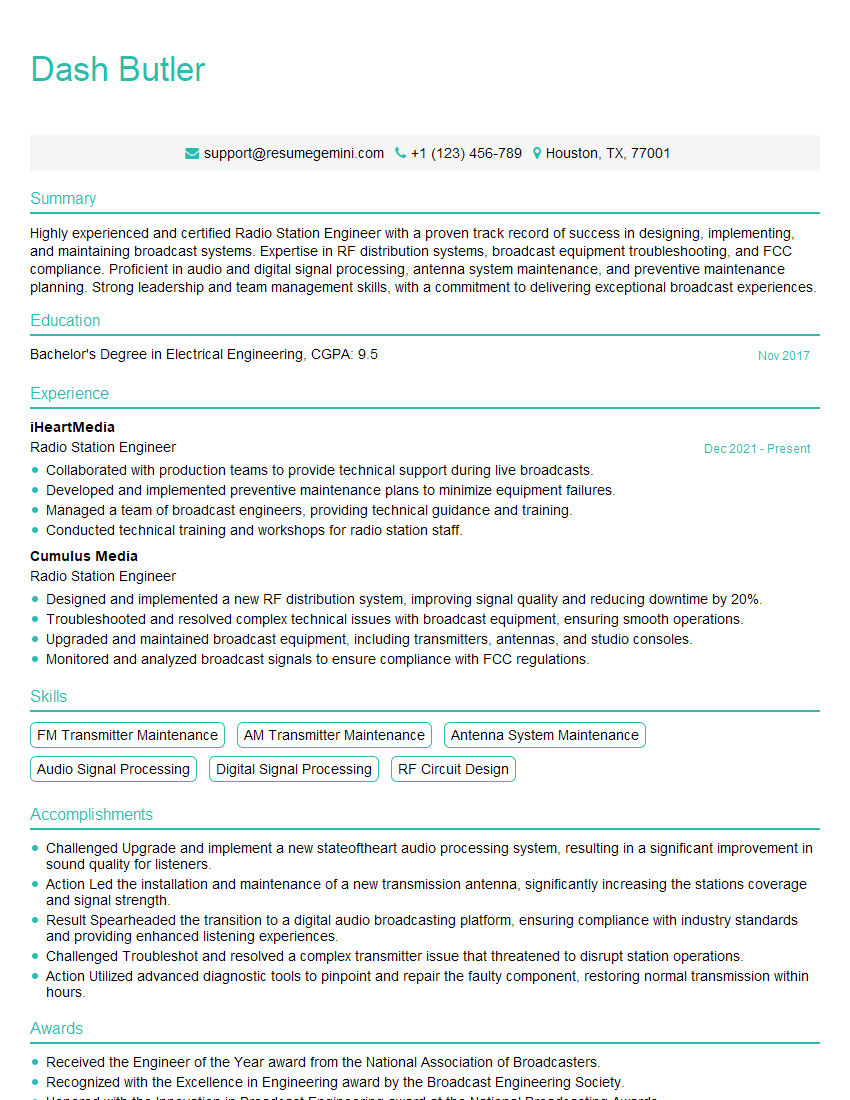Are you a seasoned Radio Station Engineer seeking a new career path? Discover our professionally built Radio Station Engineer Resume Template. This time-saving tool provides a solid foundation for your job search. Simply click “Edit Resume” to customize it with your unique experiences and achievements. Customize fonts and colors to match your personal style and increase your chances of landing your dream job. Explore more Resume Templates for additional options.

Dash Butler
Radio Station Engineer
Summary
Highly experienced and certified Radio Station Engineer with a proven track record of success in designing, implementing, and maintaining broadcast systems. Expertise in RF distribution systems, broadcast equipment troubleshooting, and FCC compliance. Proficient in audio and digital signal processing, antenna system maintenance, and preventive maintenance planning. Strong leadership and team management skills, with a commitment to delivering exceptional broadcast experiences.
Education
Bachelor’s Degree in Electrical Engineering
November 2017
Skills
- FM Transmitter Maintenance
- AM Transmitter Maintenance
- Antenna System Maintenance
- Audio Signal Processing
- Digital Signal Processing
- RF Circuit Design
Work Experience
Radio Station Engineer
- Collaborated with production teams to provide technical support during live broadcasts.
- Developed and implemented preventive maintenance plans to minimize equipment failures.
- Managed a team of broadcast engineers, providing technical guidance and training.
- Conducted technical training and workshops for radio station staff.
Radio Station Engineer
- Designed and implemented a new RF distribution system, improving signal quality and reducing downtime by 20%.
- Troubleshooted and resolved complex technical issues with broadcast equipment, ensuring smooth operations.
- Upgraded and maintained broadcast equipment, including transmitters, antennas, and studio consoles.
- Monitored and analyzed broadcast signals to ensure compliance with FCC regulations.
Accomplishments
- Challenged Upgrade and implement a new stateoftheart audio processing system, resulting in a significant improvement in sound quality for listeners.
- Action Led the installation and maintenance of a new transmission antenna, significantly increasing the stations coverage and signal strength.
- Result Spearheaded the transition to a digital audio broadcasting platform, ensuring compliance with industry standards and providing enhanced listening experiences.
- Challenged Troubleshot and resolved a complex transmitter issue that threatened to disrupt station operations.
- Action Utilized advanced diagnostic tools to pinpoint and repair the faulty component, restoring normal transmission within hours.
Awards
- Received the Engineer of the Year award from the National Association of Broadcasters.
- Recognized with the Excellence in Engineering award by the Broadcast Engineering Society.
- Honored with the Innovation in Broadcast Engineering award at the National Broadcasting Awards.
- Presented with the Broadcast Engineer of Distinction award by the Society of Broadcast Engineers.
Certificates
- FCC General Radiotelephone Operator License
- SBE Certified Broadcast Engineer
- SMPTE Certified Video Engineer
- CEDIA Certified Electronics Technician
Career Expert Tips:
- Select the ideal resume template to showcase your professional experience effectively.
- Master the art of resume writing to highlight your unique qualifications and achievements.
- Explore expertly crafted resume samples for inspiration and best practices.
- Build your best resume for free this new year with ResumeGemini. Enjoy exclusive discounts on ATS optimized resume templates.
How To Write Resume For Radio Station Engineer
- Highlight your technical expertise and experience in broadcast engineering.
- Quantify your accomplishments with specific metrics and results whenever possible.
- Showcase your ability to work independently and as part of a team.
- Emphasize your commitment to continuous learning and professional development.
- Proofread your resume carefully for any errors.
Essential Experience Highlights for a Strong Radio Station Engineer Resume
- Designed and implemented a new RF distribution system, improving signal quality and reducing downtime by 20%.
- Troubleshooted and resolved complex technical issues with broadcast equipment, ensuring smooth operations.
- Upgraded and maintained broadcast equipment, including transmitters, antennas, and studio consoles.
- Monitored and analyzed broadcast signals to ensure compliance with FCC regulations.
- Collaborated with production teams to provide technical support during live broadcasts.
- Developed and implemented preventive maintenance plans to minimize equipment failures.
Frequently Asked Questions (FAQ’s) For Radio Station Engineer
What are the key skills required to be a successful Radio Station Engineer?
The key skills required to be a successful Radio Station Engineer include: FM Transmitter Maintenance, AM Transmitter Maintenance, Antenna System Maintenance, Audio Signal Processing, Digital Signal Processing, RF Circuit Design, and FCC regulations.
What are the career prospects for Radio Station Engineers?
Radio Station Engineers are in high demand due to the increasing complexity of broadcast technology. With experience, Radio Station Engineers can advance to management positions or specialize in areas such as system design or field engineering.
What is the work environment like for Radio Station Engineers?
Radio Station Engineers typically work in a fast-paced environment, often under tight deadlines. They may work in a variety of settings, including broadcast studios, transmitter sites, and remote locations.
What is the salary range for Radio Station Engineers?
The salary range for Radio Station Engineers can vary depending on experience, location, and employer. According to the U.S. Bureau of Labor Statistics, the median annual salary for Broadcast Technicians was $58,280 in May 2021.
What are the educational requirements for Radio Station Engineers?
Radio Station Engineers typically need a Bachelor’s degree in Electrical Engineering or a related field. Some employers may also require certification from the Society of Broadcast Engineers (SBE).